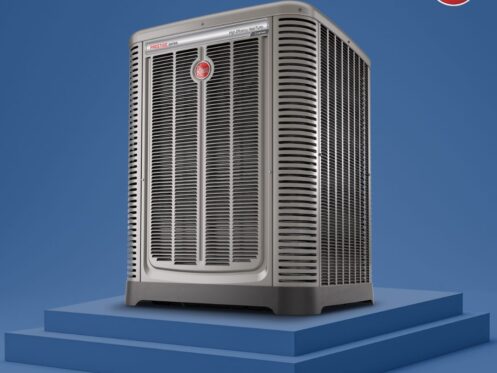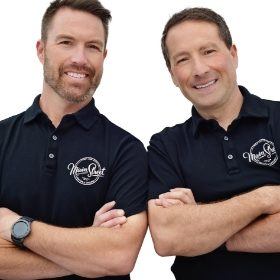If you are in the market for a system that will heat your home, choosing between a furnace-based system and a heat pump can be challenging. After all, how different could they be? They are both meant to do the same thing, right? Upon examining the qualities of both, it becomes clear just how different from one another these systems can be and why, in some situations, one might be preferable to the other.
What Is a Furnace?
A furnace is a system that forces hot air through ductwork. The hot air is created by utilizing electricity, natural gas, propane, or fuel oil, which heats a burner. The heat that comes from the burner’s combustion is then transferred to a heat exchanger. A fan blows this air across the heat exchanger, and the resulting hot air is dispersed throughout a building.
What Is a Heat Pump?
A heat pump is a system that transfers heat from one area to another for the purpose of both heating and cooling. It pulls heat from outside air or underground, transfers it to liquid refrigerant, and pumps this refrigerant to a heat exchanger or coil. Air is then blown across the coil, heated, and dispersed throughout a building. During the summer, these systems act as air conditioners, removing heat from a building and transferring it to the cooler outside air.
It is not necessary for it to be hot outside for a heat pump to pull radiant heat energy from the air or ground. The technology for this system can even work in colder temperatures. Geothermal heat pumps are not adversely affected by cold weather, but air-sourced heat pumps may need to rely on a supplemental heat source, such as electric heat strips or a furnace, when the temperature falls below 40 degrees.
Comparing Heat Pumps and Furnaces
Efficiency
Furnaces utilize an energy source such as natural gas, electricity, oil, or propane to produce their own heat. Of these energy sources that can be used, natural gas is the most efficient for a furnace because the generated heat is hotter. However, even the most efficient method of utilizing a furnace is still less efficient than a typical air heat pump at non-freezing temperatures. During extreme winters, a furnace may be more efficient than an air heat pump because it operates without regard to the outside temperature.
Heat pumps use a very small amount of electricity when they are moving heat from one area to another. This makes this system extraordinarily efficient. That being said, air heat pumps may have to run constantly and rely on a backup heating source during very cold winters to warm a room adequately. In this type of setting, it can be said that air heat pumps are less efficient than furnaces.
Lifespan
Furnaces are large, sturdy pieces of equipment only used when the weather turns cold. It is typical for a furnace to last 20 years or more before a replacement is needed.
Heat pumps, on the other hand, operate all year and have a lifespan of roughly 15 years. To get to that kind of longevity, though, a heat pump will require regular maintenance. Along the way, various components will likely need to be replaced. Even under optimal conditions, a heat pump is still going to have a shorter lifespan than a typical furnace.
Maintenance
Furnaces should have an annual maintenance check by an HVAC professional. The homeowner, however, should regularly change the filter during the colder months to help keep this type of system running smoothly for many years.
Keeping a heat pump maintained requires the owner to pay attention to the outside unit, a chore that is not needed for an indoor furnace. For example, during the winter months, you will need to keep the system clear of any snow or ice. In order to promote effective airflow during the rest of the year, it will also be necessary to check for and remove any debris, leaves, and plants that may collect around the heat pump. You will also need to regularly change the air filters about once a month.
Safety
Heat pumps run on electricity, which is a non-combustible energy source. However, a furnace’s fossil fuel sources, including oil, propane, and natural gas, are potentially much more dangerous since they are flammable and produce carbon monoxide when burned. Gas leaks may occur in the supply line or within the furnace, increasing the chances of an uncontrolled fire. In addition, potentially deadly carbon monoxide may escape into the environment if the exhaust flue is blocked or the heat exchanger is not working properly.
Maximizing the Benefits of Heat Pumps and Furnaces
As you can see, there are pros and cons to both heat pumps and furnaces. An air heat pump efficiently cools and heats during most of the year, and the more expensive geothermal model works well in all temperatures. When winter comes, however, an air heat pump can be inefficient for keeping a house warm because it may have to use a supplemental heat source.
If you live in the Sandy, UT area, having some questions about which type of unit is going to work best for you and your family is completely understandable. After all, Sandy gets an average of 45 inches of snow a year, so opting for a system that may not be the most efficient at keeping you warm in the winter is not ideal.
Therefore, you have two choices: Invest in an expensive geothermal heat pump system that keeps you comfortable all year, or purchase an air heat pump system and use a backup heating source when necessary. With this type of system, you may have a furnace and a heat pump working together, trading off duties based on which unit will offer the most efficiency at any given time. For example, while running the heat pump offers the most efficiency during normal weather, should the need for heat exceed its capabilities, the furnace takes over heating duty until the indoor temperature reaches the desired level. This type of system maximizes the strengths of both appliances, providing consistently energy-efficient heat, no matter the weather conditions. This configuration could significantly improve your efficiency and cut down on your utility bill throughout the entire year.
Meeting With a Professional
If you would like to speak to a professional about weighing the pros and cons of furnaces and heat pumps, we are happy to be there for you. Main Street Heating & Cooling has over a decade of experience serving Sandy and the surrounding areas. Our dedication to the good people of this community can be seen with every service call. Our team can be counted on for all of your heating, cooling, and plumbing needs. Not only can we give you expert advice on your system, but we can also offer repairs, installations, and routine maintenance. Contact Main Street Heating & Cooling today!


